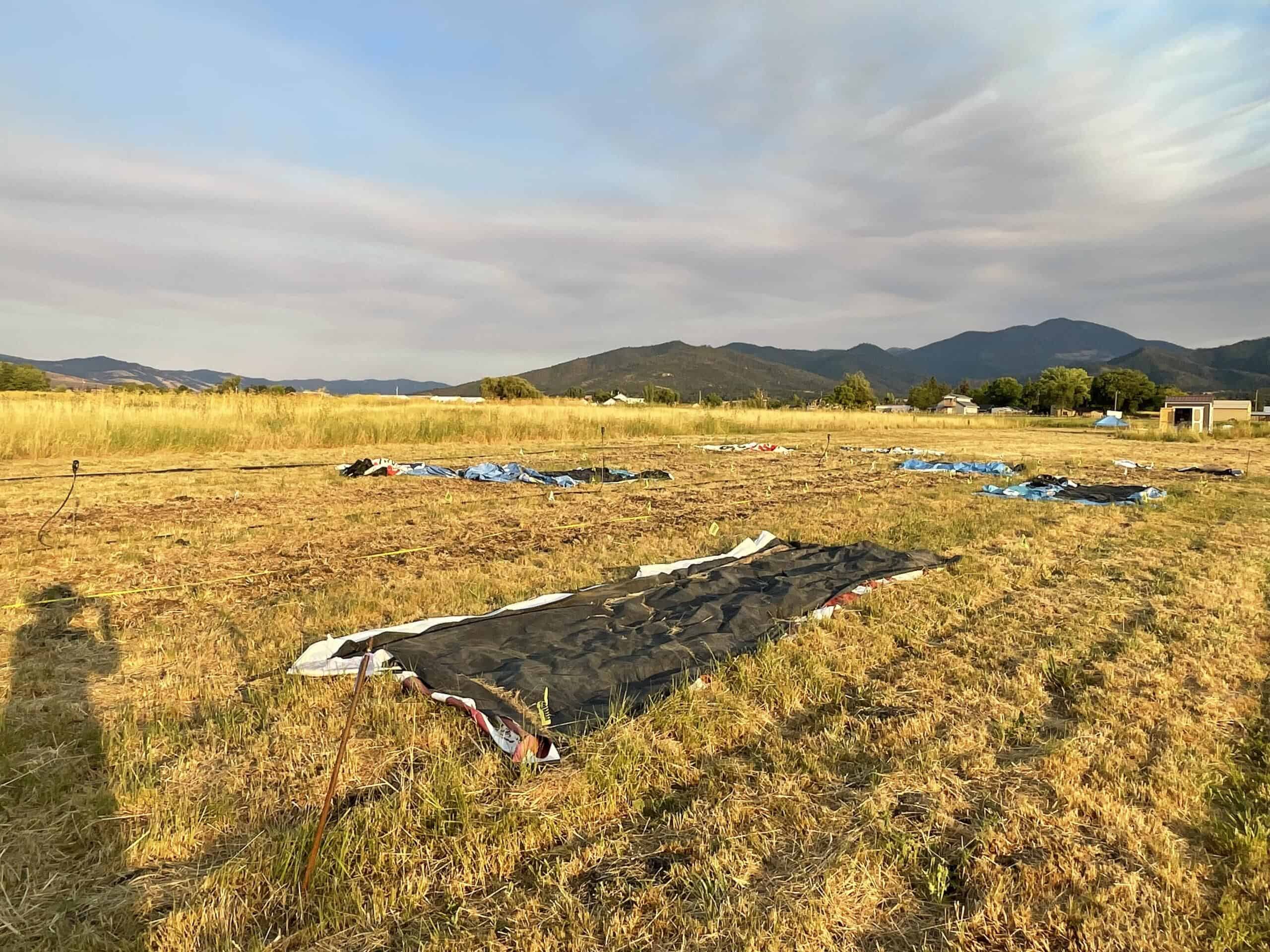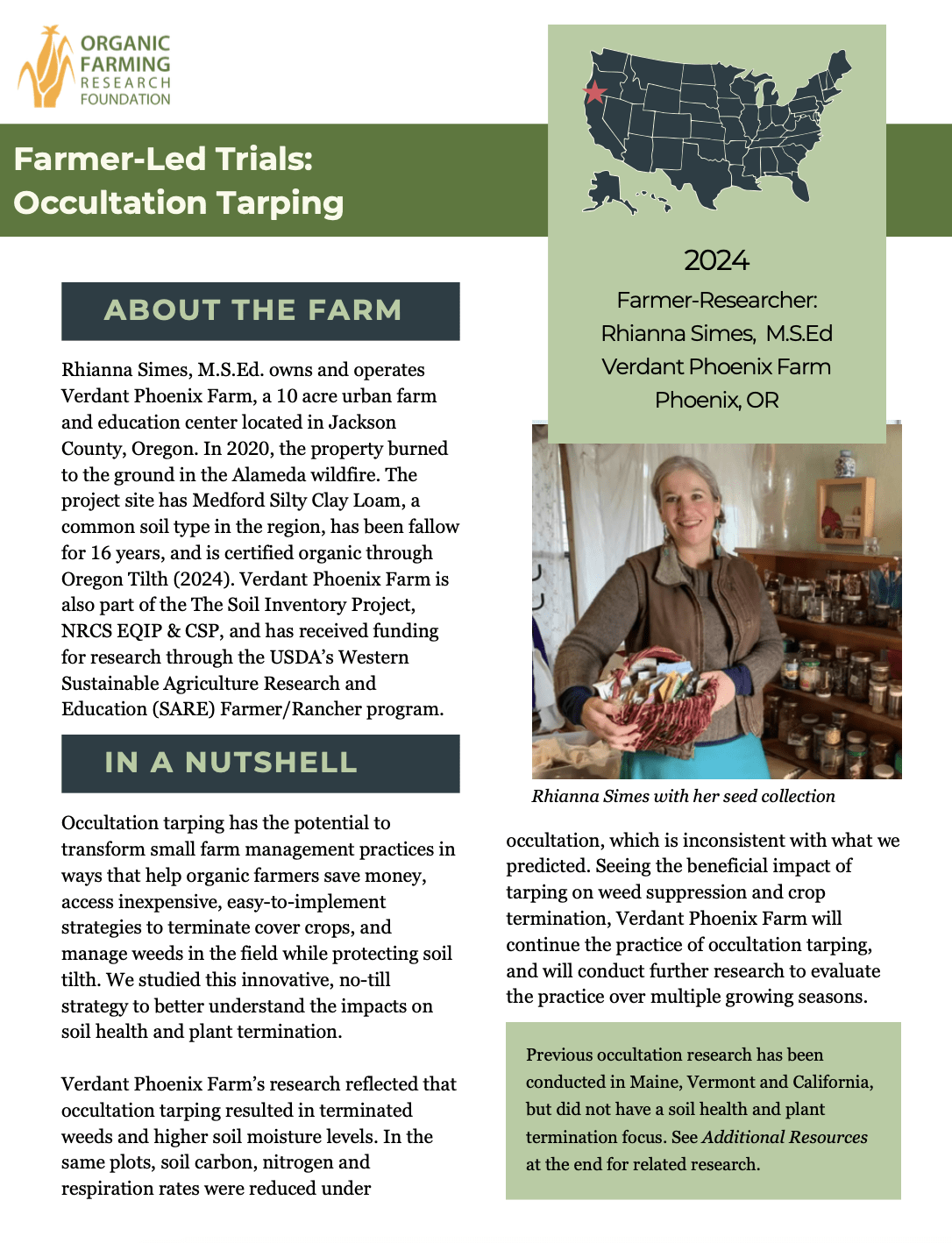Written by Jose Perez, OFRF’s Research & Education Engagement Coordinator

Rhianna Simes, M.S.Ed. owns and operates Verdant Phoenix Farm, a 10-acre urban farm and education center located in Jackson County, Oregon. The farm is managed as a no-till production system and is certified organic. Rhianna operates the farm as a research and education hub, hosting educational workshops, hands-on demonstrations and farm tours. She sells nursery stock, seeds, basketry willow, plant starts, and other products through the farm stand and on their website. Additionally, Rhianna has been breeding fava bean and popcorn (working towards a ‘Phoenix Blackberry’) for years. Rhianna’s farm vision is inspired by the work of Masanobu Fukuoka, Rowen White, and Dr. Elaine Ingham to create thriving agroecosystems.
Image at right: A close-up of the soil after tarps were removed.
Occultation tarping
Rhianna has been using occultation tarping to terminate cover crops and manage weeds while protecting soil health for years. In two different locations, she converted 10-acre hay fields into no-till, row-cropping systems using only occultation tarping. To do this, in 4-6 week increments, she places a vinyl tarp on top of the soil to act as a ‘smother,’ which encourages the biological activity of the soil to eat the organic matter on the soil (and under the tarp). In the past, farmers employed solarization, but this method allows sunlight to heat the soil but does not encourage biological activity, which happens only in the darkness (occult = dark). By not allowing any light through, occultation tarping supports the soil food web and can help suppress weeds, terminate cover crops, and protect the soil from erosion. This practice has a lot of potential to help small-scale organic farms, especially in no-till systems. Occultation removes the need for tilling to terminate weeds and crops. Rhianna is passionate about sharing the multiple benefits of using occultation tarping in small farms, but she has often found a lack of trusted information and research demonstrating the usefulness of this practice.
The Farm Trial
With technical support from OFRF, Rhianna decided to create a farm trial that would compare the use of occultation tarping in no-till and tilled conditions. This means that she is investigating two different practices in the same trial: tarping and tilling. Soil sampling will be the primary way to measure differences in these practices and will evaluate soil parameters such as soil organic matter, carbon mineralization potential, and aggregate stability. The yield of planted crops will also be compared among treatments.
Rhianna began the farm trial in a non-cultivated field in mid-April. Before placing the tarps, she took a baseline soil sample and sent it to Oregon State University Soil Lab for analysis. As planned in her research design, she laid tarps on the no-till fields for 6 weeks, and in late June, she removed the tarps and direct seeded the field with a reliable polyculture that includes popcorn, bush beans, radish, basil, beets, and fava beans. Rhianna and the OFRF team are excited for the yield and soil sample data that will be taken after harvest this fall.
Rhianna is invested in this farm trial in the long term, as she has been awarded additional funds from Western SARE Farmer / Rancher grant to continue this research for 3 years. At OFRF, we are excited to be part of Rhianna’s effort to investigate the potential of these practices for small-scale organic farmers in the region and beyond.
Below images: On the left – A view of the tarping and tilling trial. On the right – another view of the farm trial showing tarping and non tarping areas.

“The OFRF Farmer-Led Trial program offers an incredible opportunity for farmers to explore innovations we have developed. OFRF provides financial assistance to offset expenses of the project, and access to technical assistance from their trained professionals. This program has given me the courage and support I needed to pursue my research in no-till farming through occultation tarping, and to share the impacts so that others benefit. I feel honored to be part of this effort.” – Rhianna Simes, M.S.Ed., Verdant Phoenix Farm, owner/ farmer/ organic soil nerd

Research Results
Rhianna Simes’ farmer-led trial investigated the effectiveness of occultation tarping as a no-till strategy for weed suppression and soil health management. By comparing tarped and tilled plots, she measured soil moisture, weed termination, and biological activity to evaluate the practice’s impact.
Key Findings:
- Effective Weed Suppression: Tarped plots had significantly fewer weeds, demonstrating that occultation tarping is a viable alternative to tillage for weed control.
- Increased Soil Moisture Retention: Soil moisture levels were higher in tarped plots compared to non-tarped areas, highlighting the potential of this method to improve drought resilience.
- Short-Term Reduction in Soil Respiration: While tarping suppressed weeds effectively, it also temporarily reduced soil respiration and nitrogen levels, suggesting lower microbial activity in the short term.
- Long-Term Soil Health Benefits: Despite initial reductions in biological activity, visual observations showed improved soil structure and aggregation in tarped plots, indicating potential long-term benefits for soil health.
Based on these findings, Rhianna plans to continue using occultation tarping as a tool for weed management and soil conservation. Future research could explore how repeated tarping affects soil biology over multiple seasons and its impact on crop yields.
For full details on the study’s methodology and results, read the final report.
“The OFRF Farmer-Led Trial program removes barriers for organic farmers to conduct research on strategies that can and will revolutionize farming. We are innovators in our fields, and the solutions we create today are the answers to tomorrow’s challenges. This program helps to legitimize the research, and trial and error experimenting that, as farmers, we do everyday.” – Rhianna Simes
To learn more about the work Rhianna does, check out the Verdant Phoenix Farm website https://verdantphoenix.com/about/
This story is part of a series profiling farmers who are taking part in OFRF’s Farmer-Led Trials (FLT) program. Farmers receive technical support from OFRF to address their challenges through structured on-farm trials. To learn more about OFRF’s Farmer-Led Trials Program, visit our website page at https://ofrf.org/research/farmer-led-research-trials/



